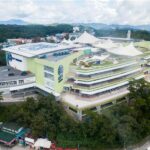Studies have shown that up to 70 percent of people spend their working hours sitting more than six hours per day, unknowingly putting themselves at risk for developing chronic non-communicable diseases such as heart disease, stroke, diabetes, and hypertension.
But lack of physical activity is not only occurring in the working population. According to Dr. Paul Quilino, Medical Affairs manager at Healthway Medical and wellness advocate, healthy sports and recreational activities are becoming less of the norm in our society regardless of gender and age.
It is widely accepted that physical activity plays a critical role in keeping one’s health and wellness in prime condition. In fact, Quilino stressed that an active lifestyle “promotes proper growth and development of the bones and muscles, helps burn stored energy, keeps cardiovascular system in tiptop condition, and helps improve overall physical endurance and agility.”
“This makes the shift to a more active lifestyle all the more important,” Quilino said. “Exercise and physical activity are probably two of the most cost-effective and significant factors that one can engage in, to help lessen the risk of developing chronic diseases. With this, Filipinos, regardless of their age, should keep a close watch on their sleep, diet, and exercise to meet in order to stay healthy.”
To ensure that Filipinos achieve the most desirable lifestyle, Healthway Medical—the most trusted and preferred mall-based clinics in the Philippines—promotes its Sleep, Eat Right, Exercise, and De-stress (S.E.E.D.) program to underpin the importance of an active and preventive healthcare especially to the working group.
According to Carmie de Leon, vice president for sales and marketing of Healthway Medical, exercise is always lauded as an effective tool in preventing all kinds of diseases. However, being active is not the sole factor that plays part in curbing a sedentary lifestyle.
De Leon said, “People who work eight hours or more daily have the responsibility take care of themselves in any way possible. Just like Dr. Quilino noted, taking the initiative to walk at least 20 minutes a couple of times within the week may help your body adapt to different physical activities. Eventually, you can slowly progress to brisk walking, then jogging, then running in greater lengths and frequency.”
When Filipinos adopt this routine, they may challenge themselves to add distance or intensify the workout until they finally get rid of such sedentary lifestyles, Quilino added.
Aside from moving a step closer to health and wellness, he said “the main goal in any ideal diet is to maximize intake of essential nutrients which are often found in fruits, vegetables and whole grains, and lessen intake of those which are known to increase our risk for chronic non-communicable disease.”
“Practically, the only way one will be able to follow such recommendations is by adapting and tailor-fitting these in their own socio-cultural preferences, as well as medical and physical needs,” Quilino added.
To further nurture one’s physicality, Quilino highlighted the importance of quality sleep in ensuring work productivity. “In all ages, sleep induces secretion of certain chemicals in the brain, which in turn signals to the whole body to regenerate. And it’s not just the length of sleep we get butthe quality of sleep as well,” Quilino said.
Quilino added, “Some studies point to the benefits of early sleep (within the first 4 hours of sleep), deep sleep on the 5th to 7th hour and near waking. What we want to point out here is that to function normally awake, we also have to care about the amount and quality of sleep we get.”
Because of today’s generation’s affinity to digital gadgets, Quilino emphasized that these modern-day technologies play a greater role in affecting people in decreasing their time and interest in more physical recreational activities. Digital gadgets effectively decrease physical activity and also play a role in disrupting one’s sleep-awake cycle, reducing sleeping time, hence, a good way to achieve quality sleep is to “keep yourself from using your phone before you sleep.”
“Most mobile games aim to instantly gratify their users, and in effect, feed (and increase) their appetite to even play more,” Quilino said. “The unwanted contrast against playing outdoors becomes more magnified and feeds into the vicious cycle. Light stimulation (not necessarily the radiation) during the sleep phase of our natural sleep-wake cycle signals the brain to stay alert, and therefore, stay awake. With this, Filipinos should opt to minimize their gadget use especially when they’re hitting the bunk.”
De Leon, on the other hand, said that while sleeping, eating right, and exercising are important pillars in achieving wellness not only in terms of mental health but also physical and social well-being, it is also crucial to take a break once in a while to curb work-related stress.
“Work-related stress is the body’s common response when people are confronted with work demands that do not match their knowledge and abilities,” De Leon said. “Since it challenges their ability to cope, 75 percent of adults experience moderate to high levels of stress, which is quite alarming.”
She added, “People who work hard to give their families a more comfortable life also need to have that comfort for themselves. With this, they need to take a break from their daily routines and do something that de-stresses them,” De Leon said.
To know more about S.E.E.D., visit our Healthway Medical clinics at the Alabang Town Center, Edsa Shangri-la, Market! Market!, Festival Mall, Healthway Manila, SM The Block and Greenbelt 5 to know more about the Healthy Heart Package.
For more details, please contact (02) 751-4929 or visit www.healthway.com.ph
.




















